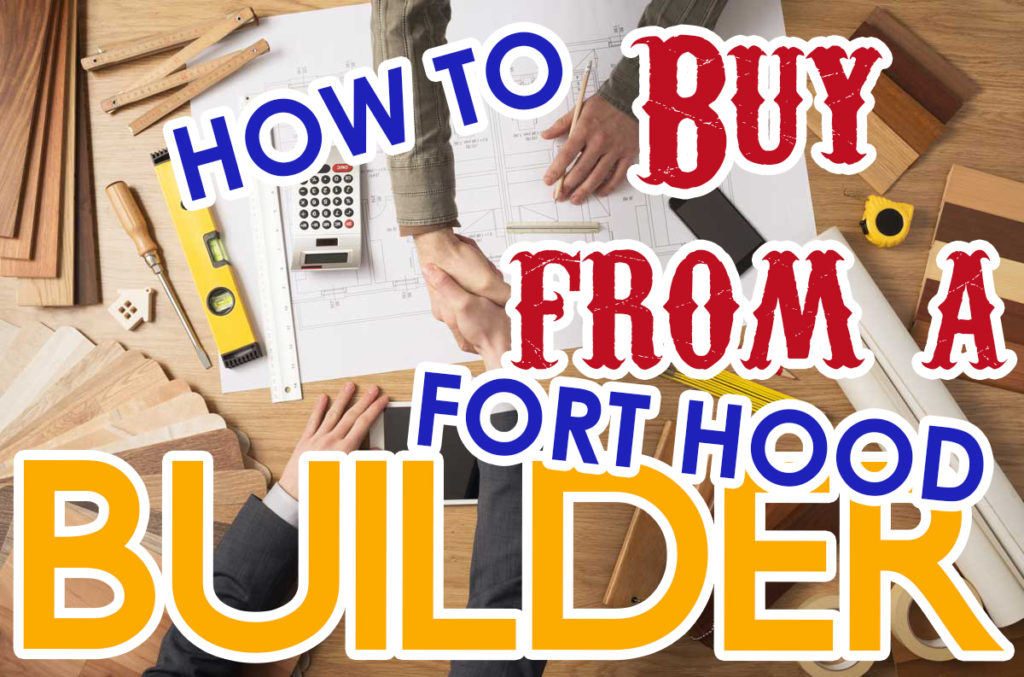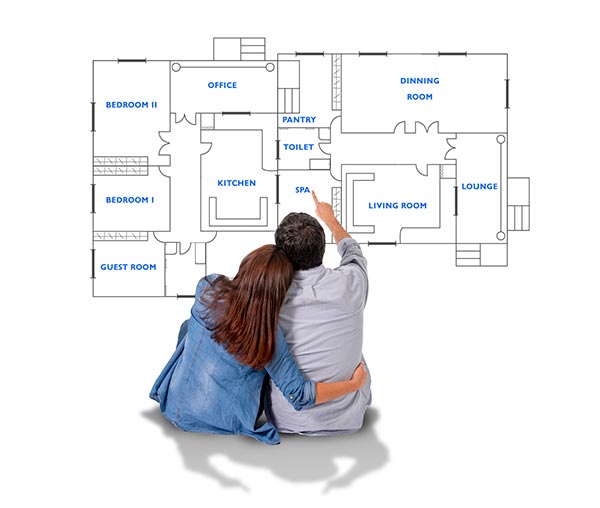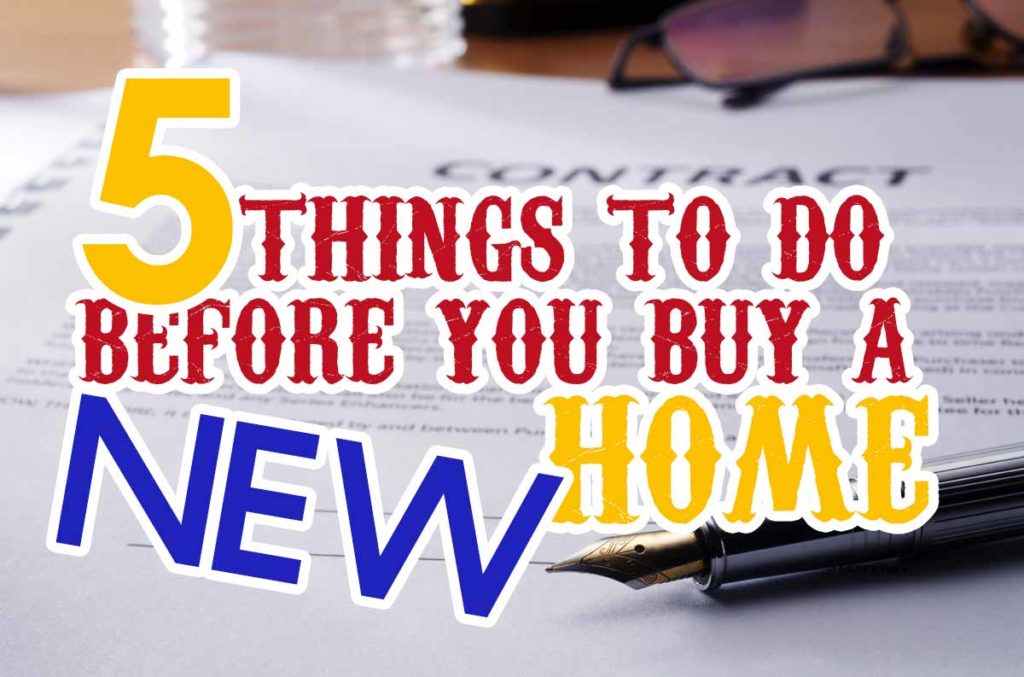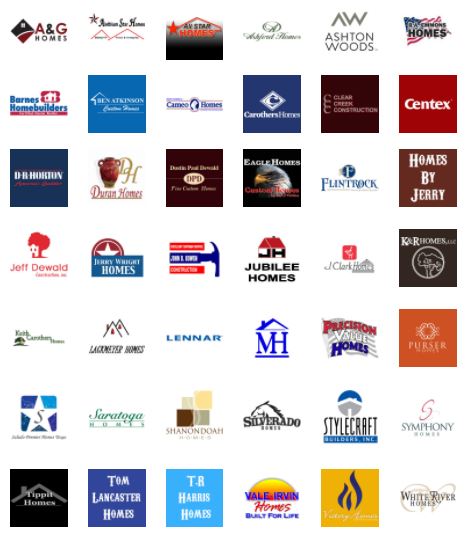
Takeaways
- Don’t buy from a builder without at least comparing to comparable resale homes first
- The Fort Hood area has a lot of different, quality builders to choose from!
- Buy a home inspection prior to closing, just like you would any other home
Builder versus Pre-owned Homes
Your first decision is whether or not a new construction home is the right decision. There are many appealing things about buying from a builder, but several disadvantages as well.
Builder Pros
- Great Condition. Nothing’s perfect, but a new home with a reputable builder is pretty close. Just about everything has a warranty on it through at least the first year.
- Customize It. You can pick exteriors, upgrades, paint colors, flooring material, counters and more. Some builders can accommodate moving walls. For higher-end custom homes, you can even get your home tailored to exactly what you want.
- Low Maintenance. Brand new, great condition – it will be a while before typical maintenance costs start kicking in. Hopefully 15 years to the first HVAC issue, 25 years to a roof repair, etc.
- Builder Concessions and Perks. Builders will often make buying their home very easy, by doing things like covering most of all of the buyer’s closing costs, or contributing free upgrades.
- Energy Efficient. Efficiency standards are constantly improving, even from year to year. Even ‘cheap’ new built homes usually have good energy efficiency ratings.
- Works with All Loan Types. Some loan types like VA and FHA can have restrictions on the quality of home, prohibiting you from considering many foreclosures and some pre-owned options. They’re not going to have a problem with a new built home.
Builder Cons
- Higher Prices. New homes in this area are going to start in the $120,000s and up, and builder homes are going to cost $10,000 – $50,000 more than comparable pre-owned homes.
- Spend Time Underwater. Buying a new home is like buying a new car. As soon as you take the keys, it has lost $1000s in value. That’s okay if you’re going to be in the house for a long time, but can really hurt if you have to sell in just a few years, owe more than it’s worth, and have to PAY to sell your home.
- Noisy. If builders are still building in your neighborhood, chances are it could be noisy with the sound of work.
- Long Wait. If the home is built and ready to go, it is just as easy as any home. But a to-be-built home can take 4 to 8 months before completion and move-in.
- Little Negotiation on the Price. Builders very seldom budge significantly on their price unless it is their last home or two in the area. Lowering the price of one home hurts the values of all their other homes in the same neighborhood. If that’s 100 homes, then lowering the price $1000 for you actually costs them $100,000.
Don’t Sign a Contract Before You’ve Done This
- Get a Realtor
- Consider, view and compare similar resale homes on the market
- Consider other builders, and more…
Inventory versus To-Be-Built
Trac and spec builders often have inventory homes, meaning completely built homes that are move-in ready. Custom home builders almost never have inventory homes unless a buyer failed to close. For buyers on a timeline, working with these builders will probably have to be their main focus.
Most builders can also do a to-be-built, or an entirely new construction, ground up. These timelines are often 5-8 months between going under contract and completion, depending on the builder and the weather. Some custom homes can even take a full year to build.
| To-Be-Built Homes | Inventory Homes |
|---|---|
| Likely can customize more/all features and pick the lot | What you see is what you get |
| Long timelines of 5-8 months to build | Often are move-in ready |
Some new construction is in between – in construction but not complete yet. These might be complete in time for your desired move-in date, and it is just a case of talking to the builder about expected timelines. These homes also might still have a few features that are not decided yet that you can have some say in, though most home choices cannot be changed after the frame goes up because everything has already been ordered.
How to Choose a Builder
List of Fort Hood Area Builders
- Learn about 40+ builders active in the Fort Hood Area
- Killeen, Harker Heights, Copperas Cove, Kempner, Lampasas and Belton
- Custom, Spec and Tract Builders
- Contact an agent to help narrow down your search!
The New Construction Process
Contract
The contract process varies with custom builders. Some contract just like a normal home. Some want a final, architect approved blueprint before coming up with the price and contract. Depending on the price and lot, you might also have to buy the land yourself in a separate contract, and then contract with the builder to build on your lot.
The Fort Hood area is a buyer-friendly market, and builders often make concessions for buyers like covering some or all of the closing costs, survey, real estate agent commissions and more. Builders seldom negotiate on the price, but do depending on the builder’s situation and the home. They do often negotiate on some of the concessions, like adding more sod, a refrigerator, additional landscaping, garage door openers, additional parking slab or other items that are not standard on a case-by-case basis. Often late in the year (December) the tract builders are more eager to meet end-of-year goals and offer the best deals.
It is a misconception that you don’t need a Realtor when working with a builder. There are many reasons you want to consider using a real estate agent when working with a builder. A quality agent will help ensure you get the best deal from the builder, but more importantly will be able to educate you about all 40+ builders in the Fort Hood area, plus compare these choices to possible resale options that would better fit your homeownership game plan.
Picking a Lender and Title Company
Many builders have a preferred lender and title company. Tract builders especially may have a lender and title company as part of their company. You always have a choice to use whatever lender you want, but these builders in the Fort Hood area often make using their lender and title company a contingency for their paying your closing costs and title policy.
Custom home builders seldom have a lender they make concessions contingent on(though they’re also less likely to offer perks like covering closing costs). But if you are buying the land separate from the construction loan, you will likely want to have a lender who is experienced with that kind of financing, to whom the builder can often recommend you.
Up Front Costs
With tract builders, the cost to get started can be extremely affordable – sometimes just a $250 earnest money deposit, though often as much as $1000 in earnest money.
Custom home builders are going to cost more out of pocket for a variety of reasons. The main one is that custom builders build very unique, high end homes that may not be very sellable if their buyer backs out. They take a lot more risks working for a client, and often build fewer than ten homes per year.
Tract Builder*
- Earnest Money ($250-$1000)
- Third Party Inspection(s) ($250-$950)
Custom Builder*
- Deposit (5-10% of Sales Price)
- Architect fee ($1000-$1500)
- Monthly Payments on Lot (if applicable)
- Upgrades ($???)
- Third Party Inspection(s) ($250-$950)
*Different builders have different terms depending on builder and circumstances
Note that custom builders often require a deposit irrespective of what kind of financing you are using. For VA loan buyers, you can still expect to be required to provide a 5-10% deposit (different from a down payment, due at closing. The deposit is due up front).
Selections / Pre-construction Meeting
If you’ve bought a to-be-built or a home that is still in the very early stages (probably before even foundation), you will get to do your selections, sometimes called the “precon meeting” with the builder. If your home is already fairly far along (usually framing and later), the design decisions are probably already final and you are probably “stuck” with whatever the builder has already chosen for the home.
Tract builders likely have their own design center with a specified number of options. These builders almost never allow substitutions to the options they provide. You’ll likely have about six different counter choices, a dozen flooring choices, several color schemes, etc. to choose from. It is a lot of fun mixing and matching all the pieces in one room to your future home!
It is more complicated for custom home buyers. The builder usually will give you a budget for each vendor, which you will visit in person and select what you want for your home. Some of the vendors that many custom builders in our area use are:
- Texas Bright Ideas (Lighting/Ceiling Fans)
- House of Floors
- Killeen Marble (Counters)
- The Knot Hole (Cabinets)
Inspections
Often builders or their representatives will tell you not to worry about having your own inspection because the city performs their own inspections. This is true (if in the city limits), but not a reason to forgo your own inspector. I have never had a new construction inspection where the inspector didn’t catch things that the city inspector missed.
“But there is a home warranty!”
Absolutely true, but that does you no good if you don’t know what is wrong! Also, it is a lot easier to get a builder to quickly address an issue before you’ve closed on a home instead of after.
Not only that – but if you are building from the ground up, you can have your inspector come out during each major phase to ensure the home is being built well. Doing this is more expensive than a typical inspection, but completely worth it in order to ensure your home is being built as perfectly as possible. Those phases are:
- foundation (before the slab)
- FEMP (framing, electrical, mechanical, plumbing)
- insulation
- final (like any other inspection)
If your home is outside the city limits, you definitely should have a third party inspector present for all major phases of construction.
Finally, you can do an “11th month” inspection during your 11th month owning the home, and while the home is still in the first year of it’s bumper-to-bumper warranty. You can take any issues that have cropped up in that first year to the builder to address.
Cold Feet
There is no room for cold feet when dealing with a builder. Unlike resale contracts, builder contracts generally do not have an option period. Changing your mind will generally cost you your earnest money and, in the case of custom home builders, any deposits you’ve made or upgrades you’ve already paid for. Once you sign a contract with a builder, you’re “in it to win it”.
Conclusion
The Fort Hood Area has many builders to choose from, and buying new can be a very fun, affordable and sound choice for some Fort Hood home buyers. Be sure to talk to a Realtor like myself to help make that decision, view comparable resale homes, and navigate through the process!
Whom to Choose?



